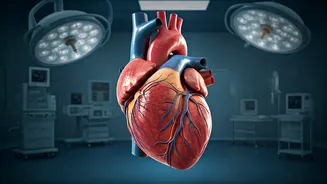Dietary Pitfalls
Even if you are committed to exercise, the food you consume can significantly impact your heart's well-being. A diet loaded with processed foods, unhealthy
trans fats, and excessive sugar can negate the benefits of your workouts. Over time, these dietary choices can contribute to the buildup of plaque in your arteries, a key factor in heart disease. The irony is, while you are working out to improve your cardiovascular fitness, poor dietary habits could be slowly damaging the very system you are trying to protect. This highlights the crucial link between what you eat and the health of your heart.
Overtraining Dangers
It is tempting to push your body to its limits, but training too hard without adequate rest can cause serious harm to your heart health. When you consistently overtrain, your body releases stress hormones like cortisol. Elevated cortisol levels can lead to increased inflammation throughout the body, putting additional strain on your heart. This constant stress can make your heart work harder than it needs to, increasing the risk of cardiovascular problems. Proper rest and recovery are essential components of any effective fitness plan.
Excessive Endurance Training
While regular exercise is generally beneficial, some forms of intense endurance training can potentially harm your heart over time. Long-distance activities, such as marathon running, may lead to structural changes in the heart. These modifications can raise the risk of atrial fibrillation, a condition characterized by an irregular heartbeat. It's essential to balance the intensity and duration of your workouts, especially if you engage in endurance activities. Always consult with a healthcare professional to determine a safe and suitable training regimen for your cardiovascular health.
Underlying Genetic Issues
Sometimes, the reasons behind poor heart health are not visible on the surface. Underlying genetic conditions can have a significant impact, even in individuals who maintain a high level of physical fitness. Pre-existing issues like hypertension (high blood pressure) or high cholesterol can silently affect your heart. Some people may also be genetically predisposed to heart disease. Regular check-ups and screenings are, therefore, essential for early detection and management of any such conditions. A proactive approach to healthcare ensures any potential issues are addressed before they become serious.
Recovery and Sleep
It is not just about the exercise; how you recover is also vitally important. Failing to get enough sleep or neglecting recovery days can severely impair your heart's ability to repair and rejuvenate itself. Sleep is critical for various bodily functions, including heart health. When you're sleep-deprived or not allowing enough recovery time, your heart becomes more vulnerable to arrhythmias (irregular heartbeats) and can also lead to increased fatigue. Make recovery a priority in your workout schedule; adequate rest and sleep will make a significant difference to your heart health.
Ignoring Physical Signs
Your body often sends signals that something is wrong. Ignoring these signals can lead to serious consequences. If you experience chest tightness, shortness of breath, or dizziness during your workouts, it is vital to pay attention to these symptoms. Such symptoms could indicate underlying cardiac issues that require medical attention. Do not dismiss such signs as a mere inconvenience. Instead, seek medical evaluation and guidance to safeguard your heart health.



















